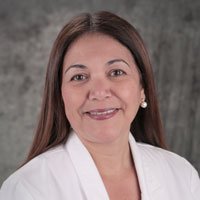Women and Heart Disease
By Teresita Ruoff, PA-C
 Heart disease is the leading cause of death in the United States for both women and men. Learning to recognize symptoms early is of great importance but it may be challenging for women since their symptoms are different than those in men.
Heart disease is the leading cause of death in the United States for both women and men. Learning to recognize symptoms early is of great importance but it may be challenging for women since their symptoms are different than those in men.
The classical presentation of a heart attack is central chest discomfort lasting a few minutes intermittently. Patients of both genders usually describe crushing, squeezing pain or fullness sensation. However, for women, chest pain may not be as intense or it may not be the most bothersome symptom. Frequently, women complain of pain down the arms, jaw, or neck without chest pain. Other more vague symptoms such as shortness of breath, nausea, dizziness, unusual fatigue, or sweats may be their main complaint. Symptoms may go unrecognized causing women to seek medical attention after there has been significant heart damage.
The following are risk factors for heart disease that are specific for women:
- Family history: first-degree male relative under age 55 or a female under age 65
- Age over 65 or younger with family history of premature heart disease
- Elevated triglycerides, along with obesity and inactivity, especially for women of ethnic minorities
- Diabetes predispose women more than men for heart disease and because diabetes alters sensitivity to pain, it predisposes to silent heart attacks
- Smoking is a greater risk factor in women than in men
- Mental stress and depression affect women’s heart health more than men's
- Post-menopausal status including women with early menopause
- Oral contraceptives: combined estrogen-progestin oral contraceptives are associated with risk of MI and stroke
- Polycystic ovary syndrome
- Pregnancy complications: preeclampsia, gestational diabetes and gestational hypertension
- Spontaneous pregnancy loss and preterm birth-prior to 37 weeks of gestation
The key is prevention and modification of risk factors:
- Stop smoking
- Exercise regularly
- Maintain a healthy weight
- Eat whole grains, fruits and vegetables, low-fat or fat-free dairy products, and lean meats. Avoid saturated or trans fats, added sugars, and salt
- Manage your stress
- Limit alcohol to no more than one drink a day
Gibson Cancer Center’s Patient Navigation Wisewoman Grant offers an excellent program to assist uninsured women who meet income eligibility for screening of cardiovascular risk through blood work, health coaching and blood pressure assessment. For more information about this program, which requires a provider referral, call (910) 671-5357 or visit